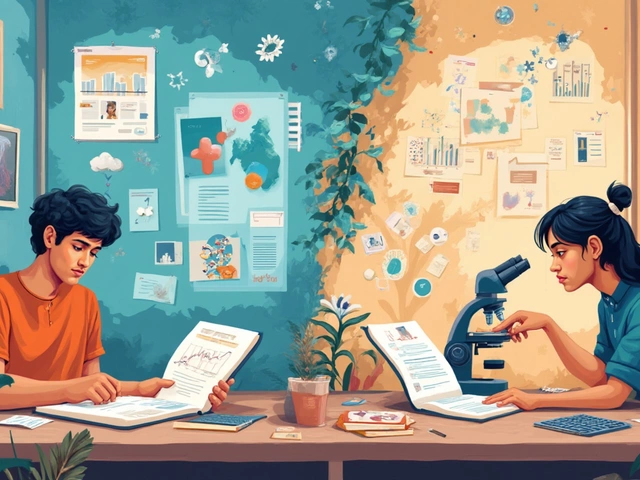
In recent years, coding has gained a reputation that precedes it, often being mistaken as an insurmountable barrier. While it's true that diving into the world of coding presents a unique set of challenges, it is not as formidable as many may believe. As we demystify this craft, you'll find that it's not just about memorizing complex algorithms but about solving problems creatively.
This journey into coding entails understanding not only its fundamentals but also the misconceptions that often deter aspiring programmers. From the stories of seasoned programmers to practical advice for newcomers, this exploration will offer clarification and inspiration. Enter the world of coding with an open mind, ready to embrace learning and discover how these skills can reshape your perspective and career.
- Understanding the Basics of Coding
- Common Misconceptions About Coding
- The Learning Curve: What to Expect
- Advice from Experienced Coders
- Tips for Beginners to Succeed
Understanding the Basics of Coding
As we embark on this journey into the world of coding, it's essential to grasp its very foundation. At its core, coding is the act of translating human thoughts and instructions into a language that computers can understand. This isn't as mystical as it sounds; it's rather akin to learning a new language. Just as with any language, coding languages have syntax, grammar, and rules that guide how statements must be structured. Popular languages you might encounter include Python, Java, and JavaScript, each with its own peculiarities and uses in software development. As learners dive into these languages, the basic constructs they meet include variables, loops, conditionals, and functions, forming the backbone of most programming tasks.
Understanding variables is a great starting point. In the coding universe, variables act as storage locations paired with a symbolic name, commonly referred to as the variable name, which contains some known or unknown quantity of information referred to as a value. Think of them as labeled boxes where data is collected for later use or manipulation. Moving on to loops, they allow the repetition of specific sets of instructions until a particular condition is met. Yet another fundamental piece is the conditional statement. These decide the flow of program execution based on different scenarios, often expressed as 'if' or 'else' statements. Functions, on the other hand, are exact sequences of instructions packaged as a unit to perform a task and often return a result. Mastering these basics doesn't happen overnight, and practice is the key to unlocking these pieces.
Strikingly, some hold misconceptions about coding being merely a mathematical enigma, but this isn't the entire truth. While logical and structured thinking undoubtedly plays a role, creativity is at the heart of coding. The late Steve Jobs once said, “Everyone should learn how to program a computer, because it teaches you how to think.” Even though programming languages have specific rules, the solutions crafted by individual developers are often unique and innovative. This creative aspect is what draws many into the world of coding, transforming confounding problems into elegant solutions.
Furthermore, real-world applications of these coding concepts are endless. Coders leverage their skills to develop systems, build web applications, analyze data, and automate repetitive tasks, among other things. The demand for such skills in the industry is burgeoning. A survey by Stack Overflow revealed that 70% of developers have either a bachelor's or master's degree, but interestingly, nearly 40% of these professionals consider formal education nonessential. Many leverage online resources, coding classes, and boot camps to acquire skills that set them up for success. This shift underscores the democratization of coding education, making it accessible to anyone with an interest and a commitment to learn.
The familiarity with coding principles is an invaluable skill set in today's digital age. As you delved deeper, it's key to understand its dynamic nature—forever evolving, forever enveloping new genres of technology. Practice, perseverance, and curiosity will be your steadfast allies in mastering the basics of coding. Whether you're aspiring to build an AI platform or simply automate a task, the practical understanding of coding provides the tools for you to stretch the limits of innovation.
Common Misconceptions About Coding
Coding tends to be surrounded by a cloud of myths and misunderstandings that often scare people away before they even give it a try. One widespread misconception is that coding requires exceptional mathematical skills. While understanding basic math can be beneficial, it's far from the only skill you need. Coding relies more on logical thinking, creativity, and problem-solving. Many successful programmers admit they do not have a strong math background but excel because they know how to think systematically and break down problems into manageable pieces. It's this ability to think critically that serves them in good stead, not just complex equations or mathematical theorems.
Another misconception is that coding is all about memorizing lines of code or being fluent in multiple programming languages. This couldn't be further from the truth. Coding, at its core, is about understanding the structure and logic of a language, and applying it effectively to build something meaningful. You don’t need to know all programming languages; mastering one or two can be quite sufficient. Most professional software development environments often require proficiency in one primary language, and the syntax can be easily looked up or referenced online. As one coder puts it, "Being a programmer isn't about what you know; it's about what you can figure out."
"It's like a form of art, where the brush is a language and the canvas is the project you're working on." – Linus Torvalds, creator of Linux
There's also the belief that coding is a lonely, solitary job, which doesn't align with the collaborative nature of modern programming. In reality, coders work closely with many teams, including design, product management, and marketing. Projects are rarely handled by one person alone; teamwork is vital. Excellent communication and collaboration skills are needed just as much as technical ability. The development of coding skills is very much a journey shared with others through pair programming, discussion boards, and team projects. Participating in hackathons or open-source projects can be an excellent way to experience this dynamism and camaraderie firsthand.
Finally, the idea that you need to start young to succeed in coding is another erroneous belief. While some may begin as children, many enter the field from diverse backgrounds at various stages of their lives. Programs and bootcamps aim to equip beginners with the necessary skills, dismissing the notion that age is a barrier. Coding fields celebrate diversity in experiences, and often those with different life and work experiences bring invaluable perspectives to the table. Successful programmers come from all walks of life, proving there isn't a one-size-fits-all route to entering this field.

The Learning Curve: What to Expect
Embarking on the journey to become proficient in coding can seem daunting at first glance, yet this path, when broken down, reveals a systematic process of mastery. Like any skill worth acquiring, programming begins with laying a strong foundation in the basics. You'll find that understanding syntax, debugging errors, and the vocabulary of the code are vital components during the initial stages. These foundational skills aren't merely the drudgery they might appear to be; rather, they are the toolkit enabling you to solve complex problems creatively. Expect to encounter challenges that may frustrate you, but with each challenge comes an opportunity to grow stronger and more adept in navigating the intricacies of coding.
The transition from novice to experienced coder doesn't happen overnight. The learning curve is often described as steep, requiring persistence, patience, and passion. This slope is peppered with trial and error, and more often than not, success is achieved through learning from mistakes. One might wonder what keeps learners motivated through such trials. The secret often lies in the community and support system that surrounds many coders, both online and offline. Whether you're a part of a bustling metaverse of developers or a close-knit coding class, enthusiasm multiplies within a collective. It is these interactions that can provide both motivation and insight as one strives to master their craft.
As you dive deeper, you might realize that the process is inherently iterative. Coding isn't just about getting something to work; it's about refining and optimizing your code, making it cleaner and more efficient. Think of coding like iterating on a piece of art; there is always room for improvement. As this becomes second nature, the curve flattens, and what once seemed insurmountable becomes routine — a testament to growth and learning. A senior developer once remarked,
"Coding is like writing a poem; you start with a blank slate, but as you find your rhythm, what once seemed daunting transforms into something beautiful."This perspective emphasizes the blend of creativity and logic that lies at the heart of programming.
In the midst of this journey, acknowledging your small victories is crucial. Whether it's a simple program that runs without errors for the first time or a more complex algorithm that optimizes a process, each success is a stepping stone. Tracking these achievements not only boosts confidence but also provides tangible evidence of your progress. It's also helpful to set incremental goals that challenge without overwhelming you. Breaking down tasks into manageable chunks and celebrating each completed piece can keep the momentum going and mitigate the risk of burnout. Remember, the path to mastery is a marathon, not a sprint.
Alongside technical skills, developing a mindset that embraces change is indispensable. Technology evolves rapidly, and as a coder, adapting to new methodologies and languages is essential. This adaptability becomes easier with time as you learn to discern between fads and enduring advancements, shaping your set of tools accordingly. With this adaptability comes the realization that learning is a continuous journey. Even seasoned professionals dedicate time to enhancing their knowledge and keeping abreast of industry trends, underscoring the importance of lifelong learning in this dynamic field.
Advice from Experienced Coders
Becoming proficient in coding is much like achieving mastery in any craft; it requires patience, practice, and the right guidance. Many seasoned developers will tell you that the initial hurdles might be daunting, but persistence pays off. While it’s important to understand the foundational concepts, coders emphasize the importance of nurturing a mindset that embraces problem-solving and continuous learning. Programming languages and technologies evolve rapidly, and staying updated is crucial. For instance, joining communities such as Stack Overflow or GitHub can be incredibly beneficial. These platforms serve as repositories of knowledge, where you can seek guidance, share projects, and learn from some of the best minds in software development.
Coders often stress the importance of not getting discouraged when faced with complex problems or when code doesn’t run as expected. Debugging is an integral part of the coding and programming process, and every error is an opportunity to learn something new and sharpen your skills. Many professional programmers still use versatile tools like Rubber Duck Debugging, where you explain your code line-by-line to an inanimate object, often leading to self-discovery of coding errors. Sharing your work with others and embracing peer reviews can also immensely help in improving your code quality, offering new perspectives and better solutions.
In the life of a software development professional, understanding and applying best practices is key. Utilizing version control systems, such as Git, plays a significant role in managing code history and collaborating with teams. Additionally, adopting a structured approach towards code documentation cannot be overstated. Proper documentation ensures that your code is not only comprehensible in the future but also accessible to other developers who might work on your projects. Such practices are not only beneficial for personal projects but are critical skills sought by employers when hiring developers.
"The art of programming is the art of organizing complexity, of mastering multitude and avoiding its bastard chaos as effectively as possible.” - Edsger W. DijkstraExperienced developers recommend aspiring coders build a strong foundation in computer science principles, such as algorithms and data structures. However, they also urge learners to strike a balance between theoretical knowledge and practical application. Building small, manageable projects can be a great way to reinforce your coding skills and gain confidence. Initiating projects that align with your interests or solve personal problems can provide motivation and make the learning process enjoyable and fulfilling.
Many successful programmers often advocate for ‘learning by doing’. When you engage actively with code, you learn to think like a programmer. While tutorials and courses are instrumental, experimenting with code and working on hands-on projects offer the best learning. Explore different programming languages to find one that resonates with you. This exploration could reveal an affinity for languages tailored to specific tasks, like Python for data analysis or JavaScript for web development, steering your specialization in a particular field of coding education. Regularly dissecting code written by others, such as open-source projects, can also be a profound learning experience, allowing you to see firsthand how experienced developers solve complex problems.

Tips for Beginners to Succeed
Embarking on the journey of learning to code can feel like setting sail on uncharted waters. But don't be disheartened. There are a few strategies that can greatly enhance your success and make your coding adventure more rewarding. Developing a strong foundation begins with embracing the coding fundamentals. By understanding the basic principles of programming, you can build the confidence needed to tackle more complex challenges down the line. Begin by choosing a language that aligns with your interests or career goals. Popular languages like Python, known for its simplicity and readability, are often recommended for beginners. Remember, mastering these basics can provide you with a sturdy platform to explore the diverse world of software development.
One of the most effective ways to learn coding is by working on projects. Projects offer the opportunity to apply what you've learned in a practical context and help solidify your understanding. Start small, perhaps with a simple calculator or a personal website, and gradually take on more challenging tasks as you grow more comfortable. This hands-on approach not only boosts your coding skills but also cultivates problem-solving abilities crucial in coding. Moreover, it's important to not shy away from seeking help. Engage with online communities where you can ask questions and share your progress. Platforms like Stack Overflow and GitHub provide rich resources and peer support for both beginners and seasoned coders alike. You'll soon realize that the coding community is a vibrant ecosystem where collaboration often leads to unexpected insights.
A quote from Steve Jobs encapsulates this sentiment perfectly, "Everyone should learn how to code because it teaches you how to think."
Persistence is key when it comes to coding. The path may be riddled with errors and bugs, but every obstacle you encounter is an opportunity to learn. Problem-solving is at the heart of coding, and with each solved problem, your skills will be honed. Aim to understand the logic behind the code rather than memorizing it. This mindset will serve as a foundation when you encounter new coding languages or frameworks in the future. Consistency in practice is equally important. Devoting regular time to coding, even if it's just an hour a day, can build a habit that encourages continuous improvement.
Staying updated with industry trends can also provide an edge. The tech world is ever-evolving, and being informed about new technologies and trends can open doors to fresh learning experiences and career opportunities. Subscribing to relevant newsletters, following industry thought leaders on social media, and participating in coding workshops can keep you in the loop. These activities enhance understanding and foster connections within the industry, making the learning experience enriching and dynamic.
| Resource | Type |
|---|---|
| Codecademy | Online Course |
| freeCodeCamp | Interactive Platform |
| Coursera | Video Courses |
Finally, don't underestimate the power of good coding habits. Writing clean, understandable code is essential not only for program functioning but also for communicating with other developers. Comment your code where necessary, use meaningful variable names, and structure your programs logically. These habits contribute to more efficient and effective coding, which is beneficial whether you're working independently or in a team. Remember, the skills and habits you develop today are valuable assets that will accompany you through your coding career.





